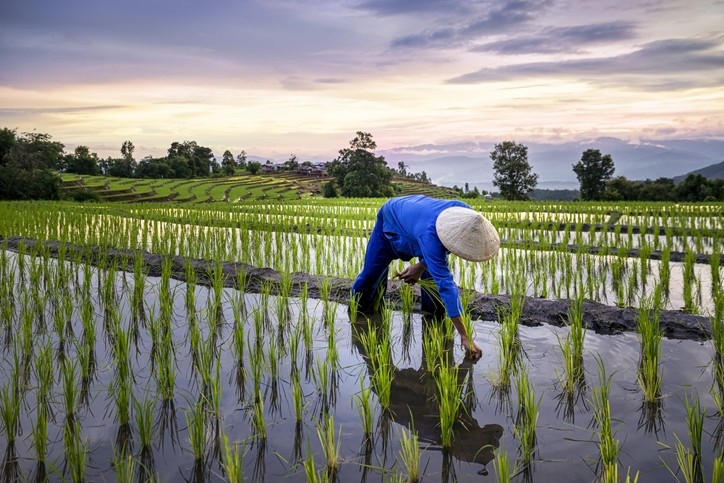Ensuring sustainable development in ASEAN agriculture: New blueprint unveiled

The blueprint, from the EU-ASEAN Business Council (EU-ABC), underscores the importance of agriculture in fostering economic growth and social development, particularly in rural communities.
Agriculture is central to the ASEAN (Association of Southeast Asian Nations) region, with significant rural populations in countries like Cambodia (74.89%) and Myanmar (68.23%). The sector's impact on the economy is substantial, contributing 22.8% to Cambodia's GDP and 22.7% in Myanmar in 2021. It also plays a critical role in employment, with 31.9% of the workforce in Thailand and 28.3% in Indonesia engaged in agriculture. These figures highlight the sector's pivotal role in sustaining rural economies and driving overall economic development.
The report elaborates on the key role of agriculture in achieving various UN SDGs, particularly those related to eradicating poverty, combating hunger, promoting decent work, and preserving life on land. It also addresses the challenges hindering these goals, including climate vulnerability, economic obstacles, technological gaps, and misconceptions surrounding organic farming.
Policy recommendations
To overcome these challenges and advance the agricultural sector, the EU-ABC proposes several policy recommendations. These include empowering farmers through decent work and agriscience, promoting digital transformation, and adopting modern agriscience and plant breeding technologies. The report also advocates for the adoption of the ASEAN Digital Economic Framework Agreement (DEFA) to modernise agricultural practices, enhance efficiency, and foster regional collaboration.
Further, the report stresses the importance of sustainable agrichemical practices and the development of regenerative agriculture to improve soil health, biodiversity, and ecosystem resilience. By implementing these strategies, ASEAN's agricultural sector can not only overcome current challenges but also contribute significantly to regional food security, economic growth, and global sustainability goals.
As ASEAN aspires to become one of the world’s largest economies by 2050, the key recommendations and strategies presented in the report offers a clear and actionable path for transforming agriculture in ASEAN into a dynamic, sustainable, and productive sector. The Council recognises the importance of public-private partnerships in this transformative journey, advocating for a shift from traditional production support to innovative, sustainable practices.
Addressing agri-credit gaps
Much of the challenges in the ASEAN region relate to a lack of credit for smallholder farmers. To address this problem, agricultural credit was recently unveiled in Philippines’ to bridge the country’s US$6 billion agri-credit gap. Agriculture is a crucial part of the Philippines’ economy, with almost 60% of the nation’s poor employed in the sector’s agriculture, forestry, fishing, and aquaculture industries. Yet the credit gap for the sector sits at over 360 billion pesos (US$6.3 billion), according to the central bank.
Two Philippine mobile payments services GCash and Mynt have therefore joined forces to introduce agricultural credit.
The two tech players teamed up with a joint mandate to create the Philippines’ largest agri-credit movement ‘to bank the rural unbanked.’ GCash and agri-technology firm Mayani will leverage the latter’s supply chain data to underwrite and jointly facilitate loans for organized farmers and fisherfolks needing a production lifeline to provide them quality inputs from Mayani, boost their yield, and enhance their capability to meet market demand while building their credit track record. For their pilot, borrowers will come from agricultural cooperatives and associations in Batangas province, one of Mayani’s rural strongholds.
Following this, Mayani intends to integrate its end-to-end proprietary tech stack with GCash’ to index on their lending balance sheet, quantum reach, and loan approval to e-wallet disbursement infrastructure.
“By leveraging on modern technology’s financial transformation, agriculture, which is one of the most important industries of our nation, can experience rapid growth and sustainability. We are honored to have Mayani onboard as one of our key partners as we continue introducing innovations that will help connect farmers with finance and enhance the power of financial inclusion in the Philippines,” said Tony Isidro, President and CEO of Fuse Lending, the licensed lending arm of Mynt.
A ‘true collaborative effort needed’
The EU-ABC report provides an in-depth analysis of the current state of agriculture in ASEAN, the challenges it faces, and the strategies needed to align with the UN SDGs, offering a roadmap for a sustainable and prosperous agricultural future in the region.
Chris Humphrey, Executive Director of the EU-ASEAN Business Council, commenting on the report said: “Agriculture is a key industry for the ASEAN region. Ensuring that the sector is well placed to continue feeding the people of ASEAN, and doing so in a sustainable way, is vital.
"This report today lays a number of recommendations that the Council and its members believe will further drive the sector forward, helping the region ensure better food security, increasing yields and the nutritional value of the food produced, reducing wastage, boosting rural incomes, and making the agriculture sector more attractive as a career choice for all, and doing so in a way that both protects the environment, the lives of farmers, and ensures the long-term viability of agricultural production.
"It will require a true collaborative effort from policymakers, the private sectors, and rural communities, but we believe it can be done to the benefit of all of the citizens of ASEAN.”









